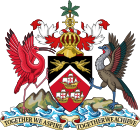
The Social Democratic Party of Albania is a minor social-democratic political party in Albania. Its founder is Skënder Gjinushi, a former Minister of Education (1987–1991) and Speaker of Parliament (1997–2001).
The Greens of Andorra is a green political party in Andorra.

The Farmers' Party was a political party in Jamaica. It contested national elections in 1955, receiving 3% of the vote, but failed to win a seat. It did not contest any further national elections.
The Republican Party was a political party in Jamaica. It first contested national elections in 1955, but received only 108 votes and failed to win a seat. It did not take part in elections in 1959 or 1962, but returned for the 1967 elections, in which it received only 45 votes. After failing to participate in the 1972, 1976 and 1980 elections it contested the 1983 elections, but received only 257 votes, again failing to win a seat. It did not contest any further elections.
The Christian Conscience Movement was a political party in Jamaica. It first contested national elections in 1983. The elections that year saw a mass boycott as the People's National Party protested against the government. The CCM received only 704 votes, which amounted to 2.7% of the total, and failed to win a seat. It did not contest any further elections.

The African National Congress was a political party in Trinidad and Tobago. The party first contested national elections in 1961, when it received just 0.5% of the vote and failed to win a seat. They did not put forward any candidates for the 1966 elections, but returned for the 1971 elections, in which the party received 2% of the vote, but again failed to win a seat as the People's National Movement won all 36. The party did not contest any further national elections.
The Caribbean National Labour Party was a political party in Trinidad and Tobago. It contested the 1956 general elections, but failed to win a seat. The party did not contest any further elections.

The Trade Union Council was a political party in Trinidad and Tobago. It contested the 1950 general elections, receiving 4.8% of the vote but failing to win a seat. The party did not contest any further elections.
The Liberal Party was a political party in Trinidad and Tobago. It contested the 1966 general elections, receiving 8.9% of the vote, but failed to win a seat. It did not contest any further elections.
The Seukeran Independent Party was a political party in Trinidad and Tobago. It contested the 1966 general elections, but received just 569 votes and failed to win a seat. It did not contest any further elections.

The United Freedom Party was a political party in Trinidad and Tobago. It contested the 1976 general elections, but received just 1,047 votes and failed to win a seat. It did not contest any further elections.

The National Freedom Party was a political party in Trinidad and Tobago. It contested the 1981 general elections, but received just 864 votes and failed to win a seat. The party did not contest any further elections.

The People's Republican Party was a political party in Trinidad and Tobago. It contested the 1981 general elections, but received just 25 votes and failed to win a seat. The party did not contest any further elections.
The Movement for Unity and Progress was a political party in Trinidad and Tobago founded by Hulsie Bhaggan. It contested the 1995 general elections, but received just 0.4% of the national vote and failed to win a seat. The party did not contest any further national elections.

The People's Voice Party was a political party in Trinidad and Tobago. It contested the 1995 general elections, but received just 16 votes and failed to win a seat. The party did not contest any further elections.
The National Transformation Party was a political party in Trinidad and Tobago. It contested the 1995 general elections, but received just 83 votes and failed to win a seat. The party did not contest any further elections.
The National Law Party was a political party in Trinidad and Tobago. It contested the 1995 general elections, but received just 0.3% of the national vote and failed to win a seat. The party did not contest any further elections.
Presidential elections were held in Colombia on 1 May 1938. Eduardo Santos of the Liberal Party was the only candidate after the Conservative Party decided not to contest the elections, and received 100% of the vote. Voter turnout was only 30.2%. Santos took office on 7 August.
The Tenants' Union was a political party in Estonia.
The Agrarian Union Party was a political party in Romania.



